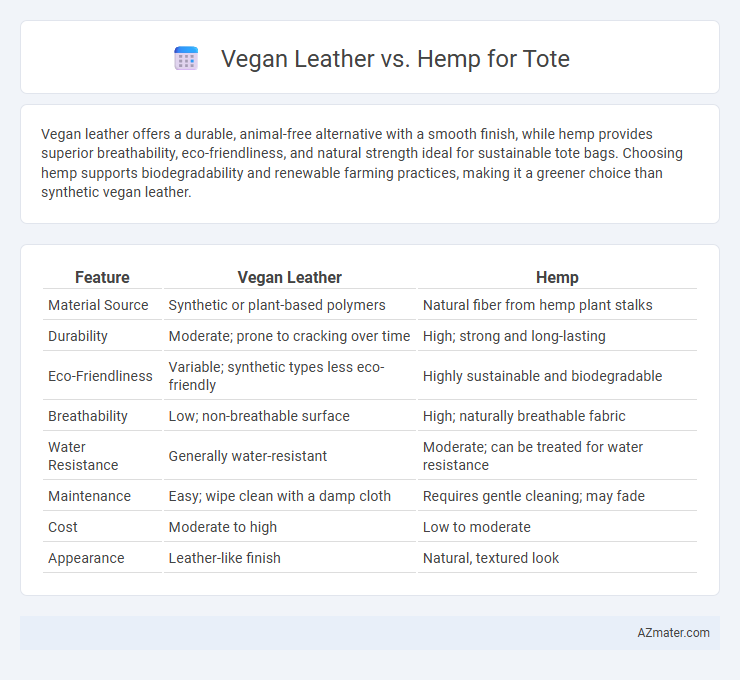Vegan leather offers a durable, animal-free alternative with a smooth finish, while hemp provides superior breathability, eco-friendliness, and natural strength ideal for sustainable tote bags. Choosing hemp supports biodegradability and renewable farming practices, making it a greener choice than synthetic vegan leather.
Table of Comparison
| Feature | Vegan Leather | Hemp |
|---|---|---|
| Material Source | Synthetic or plant-based polymers | Natural fiber from hemp plant stalks |
| Durability | Moderate; prone to cracking over time | High; strong and long-lasting |
| Eco-Friendliness | Variable; synthetic types less eco-friendly | Highly sustainable and biodegradable |
| Breathability | Low; non-breathable surface | High; naturally breathable fabric |
| Water Resistance | Generally water-resistant | Moderate; can be treated for water resistance |
| Maintenance | Easy; wipe clean with a damp cloth | Requires gentle cleaning; may fade |
| Cost | Moderate to high | Low to moderate |
| Appearance | Leather-like finish | Natural, textured look |
Introduction: Vegan Leather vs. Hemp for Tote Bags
Vegan leather and hemp present distinct options for tote bags, each with unique sustainability profiles. Vegan leather, often made from polyurethane or plant-based materials, mimics traditional leather's appearance but varies in environmental impact depending on production methods. Hemp fabric, derived from the fast-growing hemp plant, offers a durable, biodegradable, and eco-friendly alternative, favored for its minimal water usage and natural resistance to pests.
Material Origins: How Vegan Leather and Hemp are Made
Vegan leather is typically manufactured from polyurethane or plant-based materials such as apple peels, cork, or pineapple leaves, undergoing chemical and mechanical processes to mimic the texture of animal leather. Hemp fibers are derived from the stalks of the Cannabis sativa plant, harvested and processed through retting, decortication, and spinning to produce a durable, natural fabric. Both materials emphasize sustainability, with hemp offering a biodegradable alternative, while vegan leather varies in environmental impact depending on its base components.
Environmental Impact: Sustainability and Eco-Footprint
Vegan leather, often made from polyurethane or plant-based materials like pineapple or apple fibers, generally has a lower water footprint but can involve synthetic chemical processes that impact biodegradability. Hemp fabric boasts superior sustainability due to its rapid growth, minimal pesticide use, and ability to improve soil health, resulting in a significantly reduced carbon footprint. Choosing hemp for tote bags supports regenerative agriculture and produces a more eco-friendly alternative with lower greenhouse gas emissions compared to most vegan leathers.
Durability and Longevity: Which Tote Lasts Longer?
Hemp totes offer superior durability due to their natural strong fibers, making them highly resistant to wear and tear compared to vegan leather, which can crack or peel over time. Vegan leather, often made from polyurethane or other synthetic materials, tends to have a shorter lifespan under frequent use, especially when exposed to heat or moisture. Hemp totes maintain structural integrity and appearance longer, making them a more sustainable choice for long-term use.
Aesthetic Appeal: Style and Texture Comparison
Vegan leather offers a sleek, smooth texture with a polished finish that mimics traditional leather, making it ideal for sophisticated tote designs. Hemp features a natural, coarse texture with visible fibers, providing a rustic and eco-friendly aesthetic favored in casual, bohemian styles. The choice between vegan leather and hemp totes depends on the desired look--minimalist elegance versus earthy authenticity.
Cost and Accessibility: Price Points and Availability
Vegan leather totes typically range from $30 to $150, offering a wide variety of styles available in most retail and online stores, making them highly accessible. Hemp totes, while biodegradable and eco-friendly, generally cost between $40 and $100 and are less commonly stocked, often found in specialty or sustainable product shops. The price and availability differences highlight vegan leather's broader market presence compared to hemp's niche but growing demand.
Vegan Credentials: Animal-Free and Ethical Considerations
Vegan leather crafted from polyurethane or plant-based materials offers a fully animal-free alternative, eliminating the ethical concerns associated with traditional leather production. Hemp tote bags provide a sustainable, cruelty-free option with minimal environmental impact, as hemp cultivation requires fewer pesticides and less water compared to conventional crops. Both materials support ethical fashion choices by reducing animal exploitation and promoting eco-friendly manufacturing practices.
Maintenance and Care: Cleaning and Upkeep Tips
Vegan leather totes require gentle cleaning with a damp cloth and mild soap to prevent cracking and maintain their smooth texture, while avoiding harsh chemicals preserves their synthetic coating. Hemp totes benefit from machine washing or spot cleaning with natural detergents, as the durable fibers become softer and more pliable over time with proper care. Regularly air drying hemp prevents mold growth, whereas storing vegan leather totes away from direct sunlight helps avoid fading and deformation.
Consumer Trends: Popularity in Fashion Industry
Vegan leather has surged in popularity due to its cruelty-free appeal and versatility in fashion, making it a top choice for consumers seeking sustainable yet stylish tote bags. Hemp, prized for its durability and eco-friendly cultivation, is gaining traction as a natural alternative that aligns with growing demand for organic and biodegradable materials. Consumer trends indicate a rising preference for products that combine ethical sourcing with modern aesthetics, boosting the competitive presence of both materials in the fashion industry.
Conclusion: Which Tote is Right for You?
Choosing between vegan leather and hemp for a tote depends on your values and needs; vegan leather offers a sleek, stylish appearance with water resistance, while hemp provides superior durability and eco-friendliness through its minimal environmental impact and biodegradability. Vegan leather suits those seeking modern aesthetics and easy maintenance, whereas hemp is ideal for consumers prioritizing sustainability and natural materials. Evaluating lifestyle, budget, and environmental priorities will guide the best tote choice for your daily use.

Infographic: Vegan leather vs Hemp for Tote
 azmater.com
azmater.com